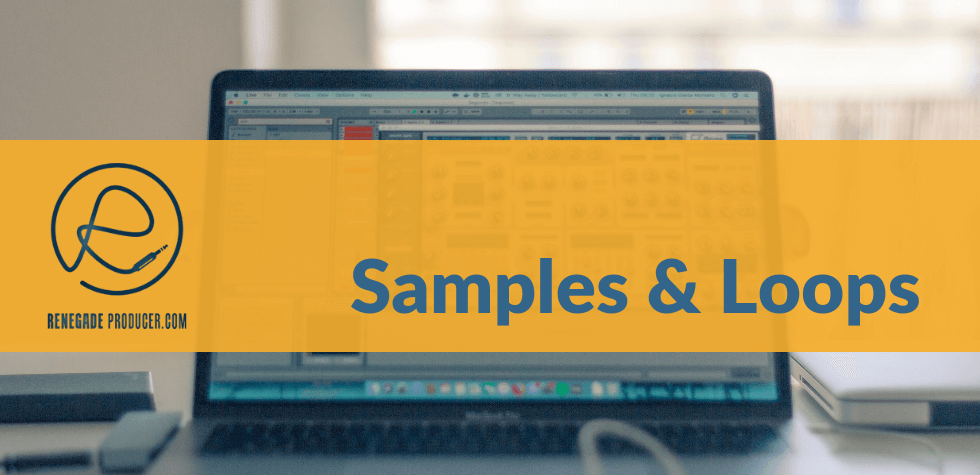25-step music production process checklist and video workshop >>>
Using Samples and Loops for Music Production
Is it cheating? Do professional producers use samples and loops? How do I grow my sample and loop library? Where can I get high quality samples and loops? Find all of the above out right now in this guide for music producers and beatmakers below...

You probably already know that one can never have enough audio samples and loops as a music producer.
You're more likely to find the exact sound you want for your track when you have a big selection of quality samples in your library.
Dance music production styles such as hip-hop, house, trance, drum & bass, dubstep, pop, electro and the hundreds of other dance genres rely heavily on the use of loops and single shot samples.
Find out below how to stock your personal sample library well so you'll have the sounds you need to complete your productions with ease.
Now, the thing to remember with samples is that there are samples and then there are samples. More about this further below.
But first, let's clear up a contentious topic...
"Whoa! Hold up! Isn't Using Samples and Loops Cheating?"
Short answer: Using samples and loops as a music producer isn't cheating. In fact, it's common practice among most producers. Which samples and loops you use and how you use them is however important to consider.
This is understandably a question that newer producers may have at some stage in their music producer journey.
It's not uncommon to start your first productions only with loops because it's one of the easiest ways to get a track going when you don't know much about MIDI, synth programming and sound design yet. Working with loops is a simple drag and drop operation.
It's not only newer producers who use loops and samples for music production...
"Do Most Producers Use Samples and Loops?"
Short answer: Mostly yes. Some people are however puritans and may frown upon the use of samples and loops in music production. It's a personal and artistic choice but using samples and loops is pretty much standard-practice, especially in dance music, hip-hop, EDM and other electronic music genres.
So, yes, many, if not most, top professionals use them although they may use it differently than a beginner would.
Rather than just throwing in a loop as is, for example, they may use a loop as a kind of template to build a groove around. This is done by writing parts under the loop or extracting the groove from the loop to MIDI. They may even remove the original loop from the track completely at some stage.
Alternatively, they may take a loop and chop it or mangle it with processing to a point where it's almost unrecognizable from it's own original state. This is more like a process of sound design where loops and samples can be used as sources to create totally new sounds and effects.
Layering samples under real instruments has also pretty much become a standard practice in pop and rock music production.
So, no, using samples and loops isn't cheating. Pretty much everyone does it, including the pros!
OK, with that out of the way, let's look at 3 ways you can grow your own collection of samples and loops...
Where Can I Get Samples and Loops?
There are 3 main ways you can get new samples and loops into your library:
- Make your own samples and loops
- Purchase high quality samples from a retailer
- Grab free samples online
Below you'll discover the main advantages and drawbacks of each method.

1. Make Your Own Samples and Loops
Cons:
- Access - You need the instruments, recording facilities, software and equipment to produce and capture your samples.
- Investment - The above things cost money in most cases, or favors if you know the right people.
- Time - You need the time to program, record and process all the samples and loops.
Pros:
- Exclusivity - You have sounds nobody else has for use in your productions.
- Quality - You can program or record samples to sound exactly as you want them.
- Potential - Once you know how to create professional sounding samples and loops you can always sell your own sample packs for extra income.
- Rights - You own the copyright for the samples you create.

2. Purchase High Quality Samples From an Online Retailer
Cons:
- Non-exclusivity - Other producers can purchase and use the exact same samples and loops.
- Investment - You have to pay and better quality samples are usually priced higher.
- Potential - You cannot usually sell samples you purchase as they are. You get a license to use them only in your productions.
Pros:
- Time - You can obtain many high quality sample packs online within minutes. You also save time because someone else, in some cases someone really good, does the recording work.
- Ease - You can grow your library fast without any work.
- Quality - You can demo the sounds to make sure the quality is good and pay more to get really high quality samples.
- Rights - You know that you can use the samples in your commercial music productions.
Where Can I Buy Samples and Loops?
I recommend Loopmasters.com (affiliate link) for online purchases of loops and samples for music production because they're the best website for music samples and loops in terms of quality, selection, ease-of-use and support.
They also have a rewards program which means you can get a range of rewards that include free sample packs, coupon codes and virtual cash to use on future purchases.
Their Loopcloud sample management app (affiliate link) allows you to search for samples right in your DAW and even audition at different tempos and pitch before you buy. Perfect for when you need a sample right now, but trawling through your own library isn't proving fruitful.
Are there other retailers for samples and loops? Yes, of course, tons of them. In my experience and based on reviews I've seen the way to make life easier when you get started with loops and samples is to just go with Loopmasters.

3. Grab Free Samples Online
Cons:
- Quality - You get what you pay for and most of the professional producers and sample providers charge for the samples they create and offer. There are good free samples to be found tough you'll need to hunt for them.
- Investment - A file is a file. Bad quality sounds can take up just as much hard-disk space as good ones. Hard-disk space costs money. No problem if you have the cash, though something to consider when you don't have the space.
- Time - Hunting down and downloading free sounds can be a tedious procedure and results may not always be too impressive.
- Non-exclusivity - Other producers can obtain and use the same files, for free.
- Rights - You need to make sure that you are allowed to use the samples in commercial productions.
Pros:
- Ease - You can get a lot of free sounds fast if you know how to search well and where to look.
- Investment - You can't do much better than free when it comes to price! ;-)
- Potential - With public domain and some other free samples you may be able to sell the samples or derivatives.
Best Free Music Sample Sites:
I suggest you use Google to find free samples. You'll also find many different sample sites and producers give away loops as an incentive to sign up for the mailing list.
Here are 3 good resources for free samples and loops:
Looperman.com - Free Samples and Loops
Wikipedia Free Sound Resources
Best Free Sample Packs:
Cymatics
Cymatics offers thousands of high-quality free samples for you to pick and choose from. You can check out their current offering here right now.
Shutterstock
Bet you didn't know this stock site had free samples on offer! Well, they do and you can grab the zip files straight from the site.
Loopmasters
You get 1GB of free samples when you sign up for the Loopmasters newsletter right now. You also get 20% off your first order, so grab this offer straight away while it's available.
MusicRadar
The SampleRadar hub page has a treasure trove of free samples available for you to download without even signing up.
The Final Word on Samples and Loops:
Samples and loops are tools that can be extremely helpful for producers. The trick is to take them and make them your own.
Create your own samples to ensure exclusivity or buy high-quality samples for your productions. Most people won't know and don't really care.
There are no rules here.
Just, make great music by any means necessary.


Learn to understand equalisers and frequencies to supercharge your mixing skills and get results, fast...

New producer? Learn everything you need to produce your first professional track right now...

Would you like to discover the simplest and easiest way to learn music theory as a music producer?
Share this post. Spread the knowledge so other producers can benefit too:
- Renegade Producer
- Music Producer Software
- Samples & Loops
ⓘ Some pages contain affiliate links so I might earn a commission when you buy through my links. Thanks for your support! Learn more

